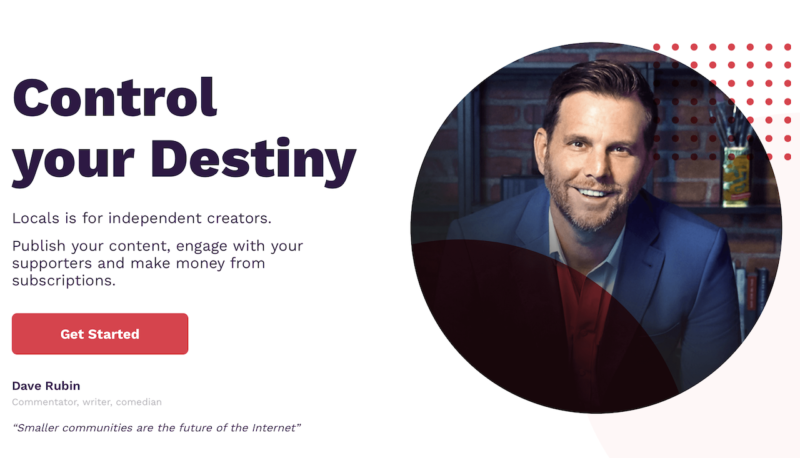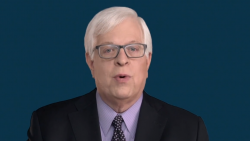Dave Rubin wants to solve the Big Tech dilemma.
The former progressive-turned-conservative pundit behind the popular “Rubin Report” YouTube show took aim at mainstream social media platforms during a Dec. 4, 2019 edition of his show, wherein he decried the dangers of censorship and bemoaned the algorithms that supposedly“deboost” and “downrank” his content.
“That is where I decided to get more into this game,” Rubin explained during the “Rubin Report” broadcast. “This is why we’ve started Locals.com.”
Founded in 2019 by Rubin and his brother-in-law and CEO Assaf Lev, Locals is a subscription-based content creation platform that allows users to focus on establishing their communities without “fear of censorship or deplatforming”—a moderation-free alternative to YouTube and the subscription-based platform Patreon. On its website, Locals claims to “empower creators to be independent” by providing the tools they need to “publish, operate, and grow all in one place.”
Since its inception in 2019, Locals has attracted a range of figures, including former presidential candidate Tulsi Gabbard, Fox News personality Greg Gutfeld, as well as far-right troll Andy Ngo. Consequently, Locals has received attention from Fox News, the Federalist, TheBlaze, the Daily Wire, and The Post Millennial, while Scott Adams, creator of the “Dilbert” comic strip, invested in Locals and touted it as a platform with “no algorithms, trolls, or Karens,” declaring it the “only platform in which I feel safe expressing my more provocative content in exclusive comics, video lessons, and blog posts.”
Portraying itself as a haven for political undesirables, Locals has continued to grow over the past couple of years, garnering an audience polarized by Big Tech as well as major investors unconcerned about funding a personality-driven digital community designed with the purpose of opposing centralized authority. That growth has accelerated following mainstream social media platforms’ crackdown on false information in the wake of the Capitol insurrection and attracted cryptocurrency influencers known for their preference for both decentralized currency systems and social media platforms.
“I think this will be internet 3.0,” Rubin said announcing its inception.
A Safe Space for Provocateurs
Ahead of the publication of his debut book “Triggered: How the Left Thrives on Hate and Wants to Silence Us,” Donald Trump Jr. announced the launch of his official Locals profile.
“I’ve been talking about setting up on Locals for quite some time with Dave Rubin,” Donald Trump Jr. stated in a video published on his Locals profile in July 2020. “He’s become a buddy of mine. I love what he’s doing, I love the message, and I love the idea of the platform. I want to set up on here. I want to be able to give you guys some exclusive content, and I want you to be able to see my stuff unfiltered and uncensored.”
Within a matter of days, more than 10,000 subscribers joined Trump Jr.’s profile, which was aptly named “Triggered” and promised “exclusive interactions and content with Donald Trump Jr. about politics and business.” While Trump Jr. never utilized Locals as his primary platform for interacting with fans and MAGA supporters, he occasionally used it to post rants about President Joe Biden and to promote his book, which itself was a glorified tirade against political correctness and supposed victimization at the hands of the left.
Along with Trump Jr., Locals is also home to “Freedomain,” a channel operated by Canadian white nationalist Stefan Molyneux which claims to strive to “achieve the truth through consistent virtue”; the “Freedom First Network” channel, “designed to give patriotic Americans a place to find the content they need to hear”; the MAGA-centric “Red Pill Patriot Show,”; and “Game Theory Politics,” a channel filled with dog whistles and quotes attributed to the anonymous Q from the far-right QAnon conspiracy theory. The overwhelming majority of the channels voiced conservative views or far-right ideologies. Even the sports channel “OutKick” is operated by Clay Travis, a sports journalist and personality who called COVID-19 “overrated” and claims that his media company of the same name is “free of woke culture and political correctness.”
Among the most concerning Locals communities is Andy Ngo’s “NGOGO ZONE,” which has acquired more than 11,000 members and is framed as a community of “dissident thinkers and truth seekers.” Ngo is the editor-at-large of The Post Millennial and is best known for his controversial coverage of anti-fascist groups in the U.S., much of which has been discredited and proven false. Apart from being a far-right provocateur who fashions himself as a gonzo journalist, Ngo has been accused of maintaining ties with extreme-right groups such as the Proud Boys.
Locals is also home to established personalities such as Dave Rubin’s own “Rubin Report” show. Rubin left Patreon in January 2019 after the platform banned YouTube personality Sargon of Akkad for using a racial slur on YouTube. At the time, Rubin was making approximately $11,000 per month from nearly 1750 patrons. By migrating to a platform without centralized content controls and no influence from major tech platforms, Rubin was able to define the paradigms of his community and followers while cementing ownership of his income stream, all while avoiding the societal accountability demanded of users on Twitter and Facebook, among others.
“Locals creates the opportunity and the platform to bridge the divide and bring people together through a community-centric conversation and respectful dialogue,” former congresswoman Tulsi Gabbard said in a Locals press release. “This is not a platform for one party or the other, but for all who value freedom of expression without fear of being silenced or cancelled.”
After witnessing YouTube demonetize several of his videos, including those in which he discussed false claims of voter fraud in the 2020 presidential election, “Dilbert” creator Scott Adams decided that his content was no longer safe on mainstream social media platforms.
“That’s pretty much the core of the Dilbert comic, that the boss creates the problem and then assigns the blame to you,” Adams told Tablet magazine earlier this month. “And the platforms have that power right now.”
Adams now runs the “Coffee With Scott Adams” community on Locals, which welcomes “open-minded people who like to learn about persuasion, politics, and the operating code for reality while having some laughs.” Ironically, he is still active on Twitter.
While Locals first found appeal with conservative pundits and far-right ideologues who feared deplatforming and lost revenue streams, the platform has now tapped into another community of downtrodden consumers: cryptocurrency influencers.
Enticing the Crypto Crowd
On April 20, 2021, Locals announced that it had raised $3.8 million in a funding round led by Craft Ventures co-founder and former PayPal executive David Sacks, AngelList founder Naval Ravikant, and Palantir co-founder Joe Lonsdale.
“Locals is a phenomenal product for content creators to connect with and monetize their audience in a community that they control,” Sacks noted in the platform’s official press release. “This is an important addition to the creator economy.”
The funding round also included investments from Gabbard, as well as notable crypto proponents such as former Coinbase chief technology officer Balaji S. Srinivasan, Christian Angermayer, co-author of “The Little Bitcoin Book” Alexander Lloyd, and Morgan Creek Digital Assets co-founder Anthony Pompliano.
Srinivasan was an early investor in cryptocurrencies such as Bitcoin and Ethereum, as well as dozens of technology companies and apps such as Dapper Labs—the company behind the NBA’s “Top Shot” NFT craze—as well as Clubhouse, the exclusive audio-only social app made popular during the pandemic. (Author’s Note: Read Right Wing Watch’s reporting on Clubhouse and its role in attracting bigots and far-right activists here) Pompliano is an entrepreneur who invested in hundreds of early-stage technology companies such as Airbnb, Reddit, Coinbase, and BlockFi. Their involvement in Locals underscores the value they see in such a platform.
While Locals is not blockchain-based like such content creation ventures as BitClout (a decentralized social media platform that allows users to buy and sell tokens based on people’s reputations), it still managed to entice crypto investors who view it as a stand out among the current crop of monetized “free speech” platforms.
Crypto influencers have often faced demonetization and restrictions on traditional social media platforms like YouTube. During the early days of the coronavirus pandemic, YouTube reportedly began deleting crypto-related content from its video-sharing platform. Some speculated that it was an issue with YouTube’s machine-learning algorithm while others began to spin the narrative that YouTube was purposely censoring crypto-related content. Whatever the case, the development spurred community interest in seeking out decentralized alternatives.
The past couple of years have seen a rise in blockchain-based content sharing platforms such as LBRY, a community-controlled blockchain protocol that allows users to tip content creators using library credits mined from the app. Others include BitTube, which uses the InterPlanetary File System (IPFS) to bypass censorship while providing privacy tokens that help maintain anonymity, as well as DTube, another IPFS blockchain platform that offers ad-free viewing and token rewards. All these entities are attempting to solve the issue with YouTube’s content monetization policies by offering avenues for creators to generate and monitor revenue streams on blockchain.
Prior to founding Locals, Rubin teamed up with Jordan Peterson to start Thinkspot, a free-speech platform that was initially supposed to rival Patreon and Twitter. The platform lauded itself as an “intellectual and creative playground for meaningful discourse” but never saw any meaningful adoption. This was in part due to the fact that Peterson disappeared in 2019 and did not resurface again until 2021 to announce his new book. Nevertheless, the platform proved to be inconsequential and uninspiring—lessons that Rubin learned prior to launching Locals. (Author’s Note: Read Right Wing Watch’s reporting on Thinkspot here.)
Instead of focusing on intellectual discourse, Rubin concentrated on engaging the right-wing’s self-imposed victimhood and longstanding fear of being silenced. By doing so, Rubin was also able to attract investors from outside the traditional political spectrum as well, making Locals among the frontrunners in the race towards censorship-resistant content creation.








